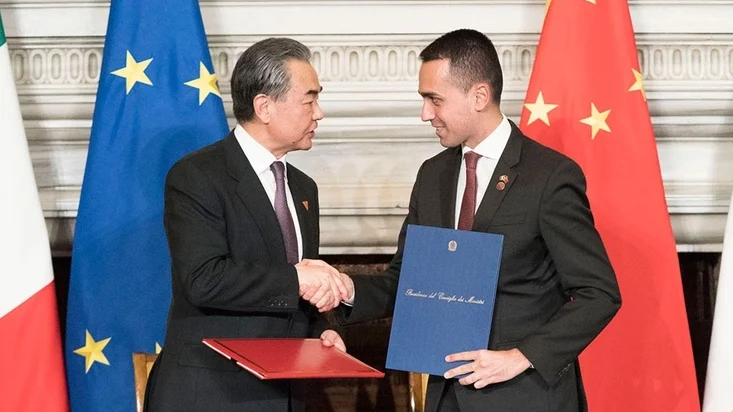(To Andrea pinto) Over the years, China has become the world's largest shipbuilder, accounting for about 41 percent of global production, according to data UNCTAD (United Nations Conference on Trade and Development). Beijing is also the largest marine trader in the world, with its port traffic accounting for 32% of global port traffic. The Republic of China, mainly through COSCO - China Ocean Shipping Company - And China Merchants, controls 18% of the world's container line capacity, about 13% of the world's LNG transport capacity and 12% of the world's crude oil capacity.
Subscribe to our newsletter!
Beijing's influence in communications networks, ports and shipping is a growing threat to Europe's critical infrastructure. A senior NATO official raised the alarm to the Times.
From the sabotage of the gas pipeline Nord Stream last year, the NATO established a military unit to investigate the safety of critical underwater infrastructure, drawing attention to the direct threat to cables and pipelines from the Russia. The Alliance has also identified risks stemming from Chinese ownership of key infrastructure, in particular telecommunications and ports.
In the Arctic region of Sweden there is a Chinese remote sensing station, initially conceived as a scientific research site, but now it is seen as a potential military threat. The level of distrust is such that some governments, including the British, have banned it TikTok from devices used by public officials and banned the use of components made by Huawei, the Chinese technology company for 5G networks.
After the Russian invasion of Ukraine and the rapprochement between Moscow and Beijing, Western intelligence considers the Chinese monopoly on infrastructure as a strategic threat. “The threat is China's control over infrastructure that can be used for espionage purposes, such as communications networks, but also to limit trade through shipment control."a Western intelligence source told the Times. “In times of geopolitical crisis, China could use its communications or shipping resources to manage the flow of data or trade, in order to weaken or undermine the Western strategic response".
Nevertheless the German Chancellor Olaf Scholz is favoring an investment plan by Beijing in the port of Hamburg. There COSCO - China Ocean Shipping Company – controlled by the Communist Party of China, is, in fact, looking to buy a minority stake of 24,9% in the Tollerort container terminal.
In the wake of the controversies triggered by the green light for COSCO to enter the port of Hamburg, attention has also been rekindled on the Italian ports and in particular on that of Trieste, where HHL extension has a stake in a terminal. “If the Germans intend to do what we have certainly announced, who are more aware of it because we are the frontier in the Mediterranean, we will not follow them with regard to this hegemonic project. We will not hand ourselves over to the Chinese“, said in one of his public statements the Minister of Enterprise and Made in Italy, Adolfo Urso. "Today all the national, European and even German instruments exist to avoid situations of control by anyone in the ports”, whereby "nothing happens that is not wanted by a government, be it German or Italian“, he declared instead Zeno D'Agostino, president of the port of Trieste.
China, however, is already present in Italian ports with the company COSCO which already arrives in our airports with its container ships. From China today we import 21 billion euros and we export 4,3 by sea.
The port aspect is instead more particular, because in many cases, in Europe, China has entered the management of an infrastructure that represents the heritage of a country.
The Parliamentary Committee for the Security of the Republic (Copasir), in the latest annual report on Italian national and economic security, spoke of Italian port infrastructures as the "strategic assets at risk“, remembering that “have already been the subject of attention from foreign actors. Consider, for example, the case of discussions with the Chinese government on the occasion of the signing of the Memorandum on the Silk Road, which has also registered an interest in the ports of Savona-Vado Ligure, Venice, Trieste, Naples, Salerno and Taranto".
The signing of the Memorandum of Understanding on Belt and Road Initiative, in March 2019 by the then deputy prime minister and minister Luigi Di Maio, raised great discussions on the centrality of Italy in the Chinese expansion project and on the opportunities or dangers for Italian infrastructures. The port authorities of Trieste and Genoa in fact they signed some descending cooperation agreements with the Chinese group China Communications Construction Company (CCCC), one of the world's largest infrastructure companies.
By the end of the year the Prime Minister, Giorgia Meloni the Italian line will have to decide on Belt and Road Initiative and he will have to decide quickly because the Conte II government granted automatic renewal unless canceled three months earlier. The five years actually expire in March next year, but to get out of it, Italy must declare it by December 2023.
The Italian government, the only G7 country to have joined the new Chinese Silk Road, is at a crossroads: to stay with China for commercial purposes and make enemies of the USA, or to abandon the imprudent agreement signed by Di Maio to weld, in lapidary way, the alliance with the USA.
Il G7 summit in Hiroshima on 19-21 May it will probably mark the turning point in the story because the decision not to adhere to Beijing's ambitions could be taken unanimously by the seven most industrialized countries of the globe. Thus removing a nice hot potato from Italy.
